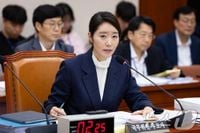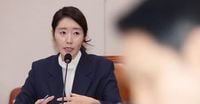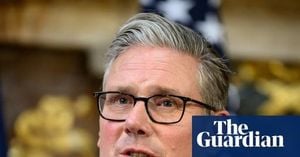On July 14, 2025, a tense and revealing confirmation hearing unfolded at the National Assembly in Yeouido, Seoul, where Kang Sun-woo, the nominee for Minister of Gender Equality and Family, faced pointed questions and serious allegations of workplace abuse and re-employment obstruction involving her former aides.
During the hearing held by the National Assembly Gender Equality and Family Committee, Rep. Han Ji-ah of the People Power Party confronted Kang with claims that numerous former aides had reported instances of "gapjil"—a Korean term describing abuse of power—while working under Kang when she was a lawmaker. Han highlighted that many aides feared retaliation and thus could not openly share their experiences, stating, "When aides exposed abuse, they risked being identified, so they couldn't even share specific details." She described the reports as shocking and emphasized their volume and specificity.
One former aide, identified as A, told reporters and was referenced in documents from Han Ji-ah's office that Kang orchestrated an environment of "wangtta"—organizational ostracism—within her parliamentary office. A detailed how Kang targeted specific aides by excluding them from group chats, publicly signaling others not to engage with them, and pressuring them to resign. After resigning, former aides reportedly faced further hardship as Kang's office allegedly interfered with their attempts to find new employment by spreading rumors labeling them as "problematic people." This pattern of re-employment obstruction reportedly repeated multiple times, effectively blocking these aides’ career prospects.
Han Ji-ah brought these allegations into sharp focus by reminding the committee of President Lee Jae-myung's statement that "nothing is more important than the problem of eating and living," questioning whether this principle applied to the treatment of Kang's former aides. She criticized the Democratic Party's response, noting that Democratic floor leader Kim Byung-ki had dismissed the reports as "defamation against the nominee" and suggested the aides involved were "abnormal." Han asked Kang directly if the party had shifted from a victim-centered approach to a perpetrator-centered one.
When Kang Sun-woo began her reply with the customary "Respected Rep. Han Ji-ah," Han immediately cut her off, stating firmly, "Don't respect me. Saying you respect me is transactional. Respect your aides." This exchange underscored the emotional and political intensity surrounding the hearing.
Han further appealed to lawmakers from both parties, emphasizing that the issue transcended political rivalry, calling it a "clear workplace gapjil and goes beyond politics," and framing it as a human rights concern. She argued that a lawmaker, who should protect aides, instead obstructing their futures was unacceptable. Han stressed, "An apology is not determined by the perpetrator but by the victim," expressing her own discomfort and shame as a fellow lawmaker that such behavior was tolerated.
Kang Sun-woo responded by reiterating her apologies to the aides who were hurt and to the public who felt discomfort watching the process. She said, "I apologize to the aides who were hurt due to my carelessness and shortcomings, and to the public who felt extremely uncomfortable watching this process." Kang agreed that whether the apology was sufficient should be judged by the victims themselves.
However, Kang strongly denied the allegations of re-employment obstruction. She stated, "That is impossible. I have no memory of such a problem." Regarding the claim that she ostracized aides from group chats, Kang explained that she was not part of the specific chat room in question, which belonged to the regional committee and was managed by the office manager who excluded a basic council member for not following decisions. She insisted she was not involved in that exclusion.
When pressed about the reports of blocking aides’ job applications at other offices, Kang said, "I am not in a position to influence hiring decisions in other offices," dismissing the allegations as unfounded. She also noted that the figure of 46 aides replaced since 2020 was inflated due to counting reappointments and that the actual number was 28, which she described as normal turnover.
Amid the controversy, Kang’s camp announced plans to take legal action against two former aides accused of maliciously spreading false information. This move sparked further debate, with critics labeling it as secondary victimization. Rep. Heo Jong-sik of the Democratic Party expressed outrage on social media, saying, "It seems someone is hidden behind the curtain tormenting nominee Kang, which is beyond deplorable and infuriating." Conversely, People Power Party spokesperson Park Min-young condemned Kang’s threat of legal action, calling it "devilish" and "unacceptable." Song Eon-seok, interim floor leader of the People Power Party, accused Kang’s side of serious secondary victimization by labeling former aides as problematic individuals.
Rep. Han Ji-ah urged the committee to objectively assess the facts, stating, "This is not a political issue but a human rights issue." She called on her colleagues to look beyond party lines and recognize the gravity of the allegations, emphasizing the responsibility lawmakers have to protect their aides' rights and futures.
The hearing also featured interventions from other lawmakers. Rep. Lee In-sun, chair of the Gender Equality and Family Committee from the People Power Party, suggested Kang needed to offer a "deeper, more specific, and sincere apology." Kang acknowledged that she did not know the identities of all the aides who raised concerns but expressed willingness to apologize directly if given the chance, noting she had apologized multiple times already.
This situation poses a significant test for Kang Sun-woo’s ministerial nomination, raising questions about her suitability to lead a ministry dedicated to protecting vulnerable groups. The allegations of workplace abuse and the potential violation of labor laws concerning employment obstruction have drawn widespread attention and criticism, highlighting the complex intersection of politics, power dynamics, and human rights in South Korea’s political landscape.
As the confirmation process continues, the National Assembly and the public await further clarifications and responses from Kang and her party. The case underscores the growing scrutiny over workplace conduct among public officials and the importance of safeguarding the rights and dignity of all employees, especially those in subordinate positions.





